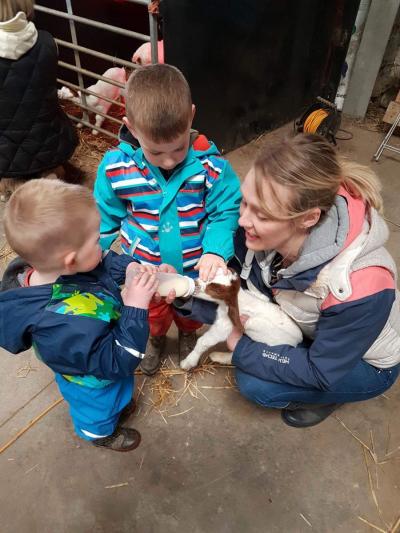Am I an agritourist?
Posted by Sharon Flanigan on Thursday 4 July 2019
I am a social researcher working on topics relating to agriculture. It is my job to ask questions, but one I have been asking myself a lot recently is, Am I an agritourist?
For my PhD I studied agritourism. I wanted to understand what it is and what motivates people to provide it and consume it. I came up with something and contributed to a conversation. In the nearly ten years since I published my first paper on the subject the conversation has continued, both in Scotland and in the academic literature.
In the last ten years my experience has also changed, both at work and at home. My work has allowed me to venture further into the realms of agriculture – visiting farms and talking to farmers and others involved in the industry more generally, for example, in my ongoing work with the Lothians and Morayshire Monitor Farms. At home, I became a mother, which also afforded me new perspective.
I don’t have a background in farming. My dad sold tractors, but I wasn’t brought up on a farm. I did enjoy the occasional opportunity to visit farms with my dad or sit in the machines and pretend. However, I am becoming gradually more familiar with what happens on farms through my work. I understand that farms are not only places of food production, but also places that produce (create and impact) landscapes, experiences, biodiversity, etc. I want to understand where my food and the food that I feed my children comes from and how it is produced. I want to understand why and how the countryside around me comes to look the way it does.
I want to speak to interesting people and get an insight into their lives. I wear multiple hats; I am a researcher, consumer, mother, and individual.
I am fortunate through my job to have access to information and experiences that increase my understanding and appreciation of farming. I am also lucky that I enjoy my job. I have multiple motivations. I need to observe and ask questions to deliver the outputs required in my job. But I also want to find out more. I want to see ‘backstage’, behind the scenes. My job puts me in the privileged position of being able to do that. But I also take opportunities in my personal life. I visit farms, farm parks, farm shops, and other businesses that I know (and sometimes don’t) originated as farm diversification projects. In these instances, I have no doubt I am an agritourist. I take my kids, go with friends or family, or go alone. Sometimes I am motivated by interaction with agriculture in some way. Sometimes I’m not. My job provides me with a lens through which to study farming. My free time provides different insights. Through both my appreciation of farming grows.
Many people’s understanding of tourism associates it with recreation and fun. Sometimes there is even stigma attached to being a tourist. But there are many types of tourism – including international and domestic varieties, overnight stays and day trips, motivated by different reasons (business, education, leisure). There is also more than one type of agritourism, as I discovered in my PhD research.
Agritourism includes products that are simply based on farm land (e.g. accommodation in farm buildings) as well as products that allow people to observe or experience elements of farming in fun and accessible ways (e.g. demonstrations of sheep shearing, pick-your-own strawberries, or watching farmers work from the window of a farm café). Agritourism includes products (parks or walks) and interactions (feeding young animals, talking to the farmer), for which charges may apply. Agritourism incorporates visits motivated by relaxation (coffee shops) and visits inspired by learning (viewing galleries). Agritourism visitors may aspire to interact with agriculture in some way (shepherding experiences) or maybe they haven’t given farming a second thought (activity centres, shops). In recent conversations I have had with colleagues and farmers about Open Farm Sunday and the Royal Highland Show, I have heard the phrase, ‘oh, is that agritourism?’ My response is always: ‘what do you think?’ Not everyone agrees or has even thought about it, but there remains an important question of how the ‘agri’ relates to the ‘tourism’.
Whatever your definition, agritourism plays an important role in the economic development and resilience of rural areas through diversification, employment, and income multiplier-effects. It also plays an important role in society, connecting people with the places and processes that bring food to our plates, and much more. It provides a way for the general public to engage with farming, and through that I believe the role it plays could be even more powerful. Could it change the way we make decisions about what we eat, where we buy our food, and how we value the people and environments upon which agriculture is founded? Or does it already? These are open questions.
In recent years, the profile of agritourism in Scotland has grown considerably, culminating most recently in the commencement of a new Agritourism Monitor Farm programme. Another opportunity for me to engage with farming and be an agritourist in a professional capacity – and one that I take great pleasure in learning from as an individual.
I am an agritourist. Are you?
Comment below, follow me on Twitter (@SharontoF) or send me an email (sharon.flanigan@hutton.ac.uk)







Comments
Post new comment